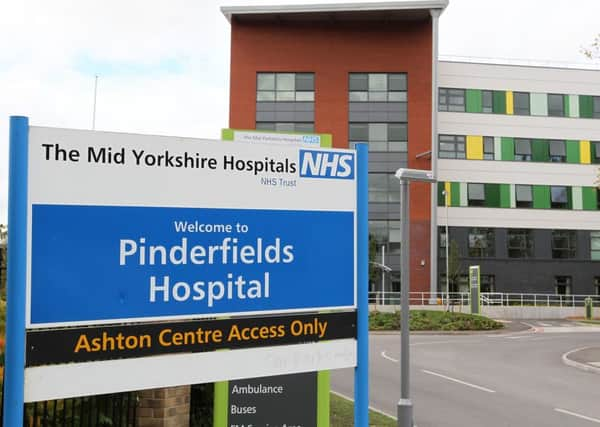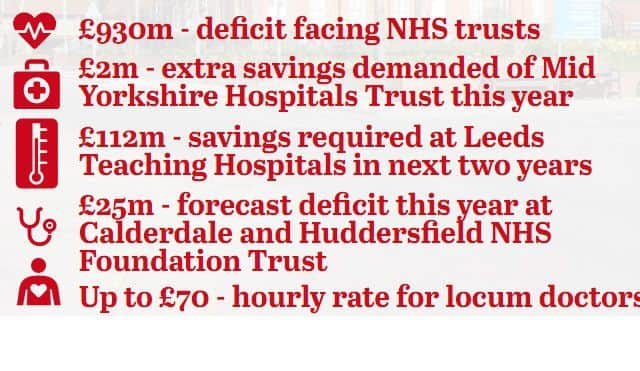Special report - How NHS cuts could affect you


The country’s 241 NHS hospital trusts had a total deficit of £930m in the first quarter of this year and failed to make budget savings ordered by the government.
Three out of four trusts were in deficit and must make massive savings to balance their books.
Advertisement
Hide AdAdvertisement
Hide AdAnd the financial position is being worsened by a recruitment crisis which has led to NHS organisations spending millions of pounds on temporary staff.


Some wards have been working with only up to 80 per cent of the required nurses, reports to hospital trust board meetings show.
Mid Yorkshire Hospitals Trust, which runs hospitals in Wakefield, Pontefract and Dewsbury, has been told by the government it must make an extra £2m in budget savings this year.
The trust had agreed with the government’s Trust Development Authority that it would have a deficit of £14.8m in 2015-16.
Advertisement
Hide AdAdvertisement
Hide AdBut the extra savings were demanded in a letter sent to trust chief executives in August.
Mid Yorkshire chief executive Stephen Eames said: “Our regulators have challenged us to make more savings this year and we are looking at a plan of how we might do that.”
Mr Eames said the trust would not compromise on patient care, which meant short-term agency staff were often used to fill vacancies, costing more than permanent workers.
He warned that strict immigration rules were also making it harder to plug staffing shortfalls with overseas workers.
Advertisement
Hide AdAdvertisement
Hide AdMr Eames said: “This year we have also looked to non-EU countries to plug the shortfall. However this has been hampered by the government’s agenda on immigration, restricting how quickly we can deploy a very good supply of non-EU nurses.”
The government had provided more training places for nurses, Mr Eames added. He said: “Longer term, the staffing situation will improve.”
Calderdale and Huddersfield NHS Foundation Trust is predicted to be around £25m in deficit by the end of this year.
But the financial shortfall could rise even higher if £16m in budget savings are not made this year.
Advertisement
Hide AdAdvertisement
Hide AdThe organisation is among 151 NHS Foundation Trusts which have a total financial deficit of £445m - £90m worse than was planned for.
Trust chairman Andrew Haigh said: “Our Trust, as all Trusts, is preparing for the extra challenges of the winter to ensure we can provide safe care for our patients and their families.
“As part of this we made a decision to invest in both additional nurse staffing as well as additional bed capacity.
“Throughout this year we have been working hard to recruit nurses and healthcare assistants and we were also successful in securing a number of recent nursing graduates who will be joining our teams in the next few weeks.”
Advertisement
Hide AdAdvertisement
Hide AdLeeds Teaching Hospitals NHS Trust expects to be £40.2m in deficit this year, and to be £29.9m in the red in 2016-17. The trust hopes to break even in 2017-18.
The organisation must make £67m in savings this year and slash £45m next year - a total of £112m.
The Leeds trust’s annual audit report said: “If the trust achieves these budgets for the next two years, it will accumulate a total deficit of over £90m by March 31, 2017.”
Suzanne Hinchliffe, chief nurse and deputy chief executive said a £13.5m investment in nursing staff was agreed in April 2014.
Advertisement
Hide AdAdvertisement
Hide AdShe said: “So far this year we have recruited over 385 new nurses into permanent roles and continue to work with local universities and use innovative recruitment campaigns to attract more nurses to the Trust.”
The government demanded £22bn in savings from NHS organisations to close the £30bn funding shortfall. An extra £2bn for the NHS was announced in the autumn budget statement, on top of £8bn already announced.
But the cash could fall well short of the funding needed.
Janet Davies, general secretary of the Royal College of Nursing, said: “Trusts under severe financial pressure often struggle to deliver effective care and often end up in a cycle of reducing staff and then plugging the gaps at a high cost with temporary workers.
“Worryingly, it seems that those pressures are now the norm.”
Advertisement
Hide AdAdvertisement
Hide AdA department of health spokesman said: “We know finances are challenging for parts of the NHS, but we’ve committed to investing £10 billion to fund the NHS’s own plan for the future.
“The NHS must play its part in delivering efficiencies so we are supporting it to employ the staff it needs at a fair price by introducing cost-control measures to clamp down on rip off staffing agencies.”